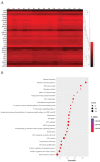Clinical and Molecular Characteristics of Megakaryocytes in Myelodysplastic Syndrome
- PMID: 38860162
- PMCID: PMC11164576
- DOI: 10.1055/s-0044-1787752
Clinical and Molecular Characteristics of Megakaryocytes in Myelodysplastic Syndrome
Abstract
Objective Myelodysplastic syndrome (MDS) is a malignant clonal disorder of hematopoietic stem cells which is characterized by morphologic dysplasia. However, the pathological characteristics of megakaryocytes (MKs) in MDS patients with gene mutation are not well established. Methods Bone marrow MK specimens from 104 patients with primary MDS were evaluated, and all patients were distributed into two groups according to gene mutation associated with functional MKs. The morphologic and cellular characteristics of MKs and platelets were recorded and compared. Results The more frequently mutated genes in MDS patients were TUBB1 (11.54%), VWF (8.65%), NBEAL2 (5.77%), and the most common point mutation was TUBB1 p.(R307H) and p.(Q43P). Patients with MK mutation showed a decrease in adenosine diphosphate-induced platelet aggregation, high proportion of CD34 + CD61 + MKs (10.00 vs. 4.00%, p = 0.012), and short overall survival (33.15 vs. 40.50 months, p = 0.013). Further, patients with a higher percent of CD34 + CD61 + MKs (≧20.00%) had lower platelet counts (36.00 × 10 9 /L vs. 88.50 × 10 9 /L, p = 0.015) and more profound emperipolesis ( p = 0.001). By analyzing RNA-sequencing of MKs, differentially expressed mRNA was involved in physiological processes including platelet function and platelet activation, especially for MDS patients with high percent of CD34 + CD61 + MKs. The high levels of expression of CD62P, CXCL10, and S100A9 mRNA, shown by RNA sequencing, were validated by PCR assay. Conclusion High proportion of CD34 + CD61 + MKs was a poor prognostic factor in MDS patients with MK mutation. CD62P, CXCL10, and S100A9 may be the potential targets to evaluate the molecular link between gene defects and platelet function.
Keywords: CD34; CD62P; MDS; MK; TUBB1; emperipolesis.
The Author(s). This is an open access article published by Thieme under the terms of the Creative Commons Attribution License, permitting unrestricted use, distribution, and reproduction so long as the original work is properly cited. ( https://creativecommons.org/licenses/by/4.0/ ).
Conflict of interest statement
Conflict of Interest None declared.
Figures





References
LinkOut - more resources
Full Text Sources
Research Materials
Miscellaneous

